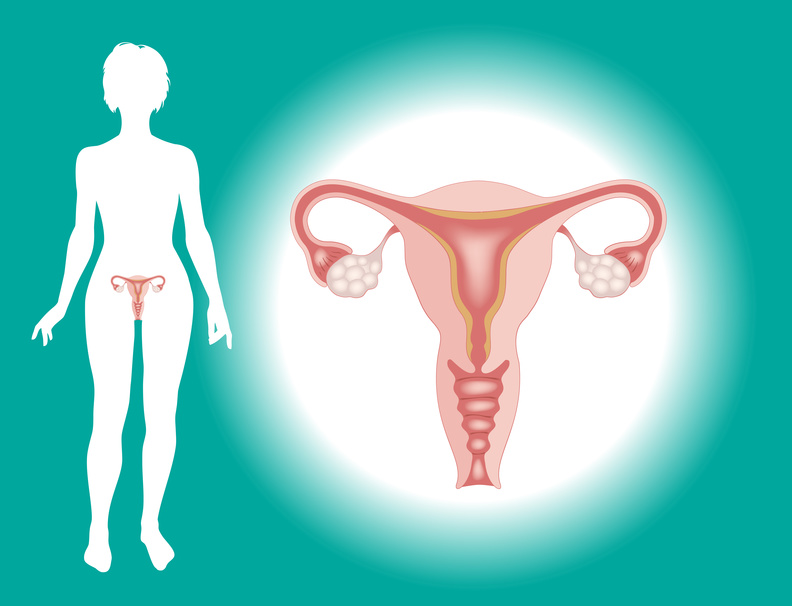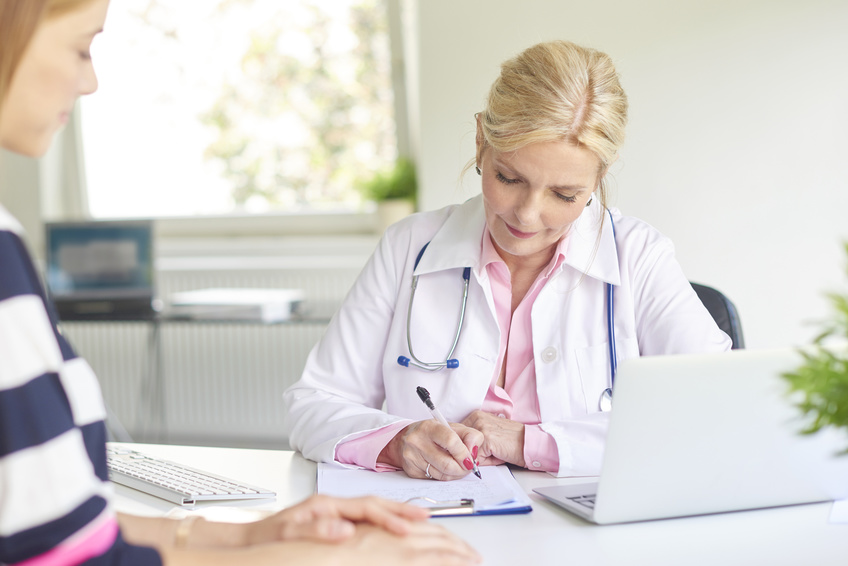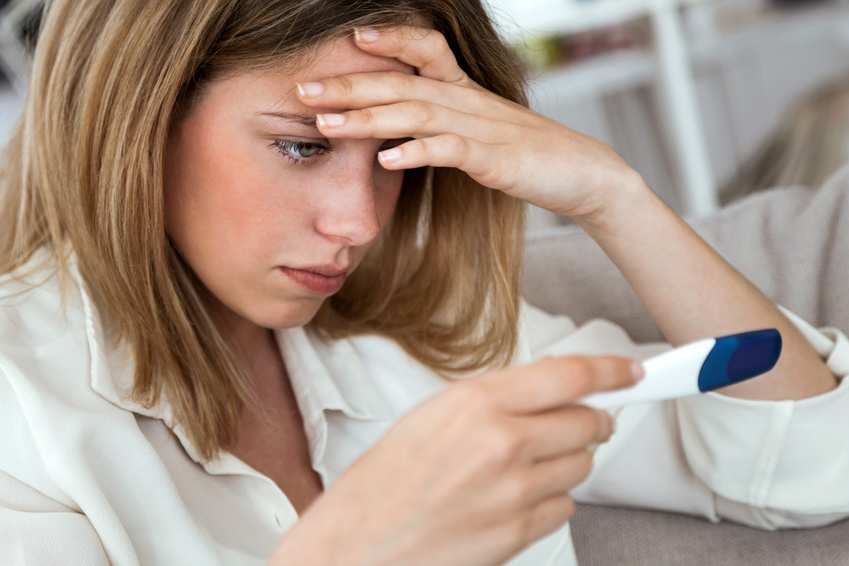What is PCOS?
Polycystic Ovary Syndrome, or PCOS, is a common cause of female infertility. It affects 20% of women worldwide[1. London Women’s Centre. Polycystic Ovary Syndrome (PCOS). Internet. Available from: https://www.londonwomenscentre.co.uk/conditions/polycystic-ovarian-syndrome], and the symptoms often arise during late teenage years or early adulthood.
There are three main features of PCOS. If you have any two of the following, you may be diagnosed with the condition:
Irregular periods, or none at all.
Periods happen as a result of a woman’s body releasing an egg, and this process is called ovulation. However in PCOS, ovulation may not occur. Therefore women may have problems conceiving.
Polycystic ovaries.
This is where the name PCOS comes from. The term describes how the ovaries become enlarged and contain a large number of follicles in women with PCOS. The follicles are sacs which contain fluid, and they can be up to 8mm in size. They are actually the sacs in which egg cells develop and healthy women have follicles too, but not as many. In women with PCOS, these follicles may not be able to release an egg. Therefore these women do not ovulate. Doctors can examine your ovaries using an ultrasound scan.
Hormonal imbalance.
Androgens are male hormones, one of which is testosterone. All women produce a small amount of testosterone in their ovaries. However women with PCOS have higher than usual levels of androgens in their bodies. This results in symptoms including unwanted facial hair growth.
 What are the symptoms?
What are the symptoms?
There are a range of symptoms and each of these can vary in terms of their severity. Women experience different combinations of symptoms, and more than half of women with PCOS do not have any symptoms at all. Some women will only have problems getting pregnant, whereas others will be able to conceive naturally without the help of any treatments.
www.amitamin.com/en/fertilsan-m New life deserves the best possible start!We provide the essential building blocks for this.
The common symptoms include:
Irregular or missed periods. This is a result of ovulation not occurring.
Difficulty getting pregnant. Many women receive a diagnosis of PCOS when they are trying to get pregnant and are repeatedly unsuccessful.
Weight gain. Around half of women with PCOS will suffer from weight gain and obesity [2. PCOS Awareness Association. Internet. 2017. Available from: https://www.pcosaa.org/pcos-symptoms].
Unwanted hair growth (also called hirsutism). This is due to high levels of androgens, which result in excess hair growth on the face, arms, chest, back and buttocks.
Thinning hair on the head and hair loss (alopecia). This may be worse in middle-aged women.
Skin problems. These include acne and oily skin and are due to the hormonal imbalance.
Mood changes and depression.
Headaches. This is also related to the hormonal problems.
Pelvic pain. This may occur with periods or at other times.
Sleep problems. These include insomnia and sleep apnoea.
Fatigue. This is related to sleep problems.
Having PCOS also increases the chances of developing other conditions. These include type 2 diabetes, high cholesterol levels, heart disease and depression.
 Causes of PCOS
Causes of PCOS
The exact cause of PCOS is unknown. However, there are some important factors involved:
Genes.
Like with many conditions, there is a genetic component. Therefore if you have female relatives with PCOS such as your mother or aunt, you are more likely to develop the condition. However, scientists have not yet found the specific genes responsible for this link.
Insulin resistance.
Insulin is an important hormone in PCOS. It signals cells to absorb glucose for energy, and therefore controls blood sugar levels. However women with PCOS tend to be resistant to insulin, which means that their cells are less responsive to it. As a consequence, their sugar levels are higher, and their bodies need to produce more insulin in order for it to have an effect.
The higher level of insulin has the additional side effect of triggering the body to produce more testosterone. This is the major problematic hormone in PCOS and it has a detrimental effect on fertility. This is because testosterone interferes with the development of the follicles in the ovaries. This causes problems with ovulation.
Furthermore, insulin resistance can result in weight gain. This creates a vicious cycle because obesity is another factor which raises the levels of insulin in the body.
Abnormal hormone levels.
This is commonly a problem for women with PCOS, and scientists are not sure why this occurs. It may be the result of insulin resistance or other unknown factors.
The common hormone problems in women with PCOS are:
 When should I see a doctor?
When should I see a doctor?
If you consistently have any of the symptoms above, you should make an appointment to see your GP. You should be particularly vigilant of any of these symptoms if you have relatives with PCOS, as you are more likely to develop the condition.
Treatment
Unfortunately there is no cure for PCOS. However, there are ways that you can manage the symptoms.
The birth control pill is useful in bringing back regular periods and reducing unwanted hair growth. Another useful medication is metformin, which increases the body’s sensitivity to insulin. Therefore it can help reduce blood sugar and androgen levels.
There are also specific treatments to help counter each symptom of PCOS, which your doctor can tell you more about:
Irregular/no periods.
Your doctor may recommend the contraceptive pill or progestogen tablets to induce periods.
Fertility problems.
There are a few options to help you become pregnant and with the help of these, most women with PCOS are able to have a child. These options include clomifene tablets, injections and IVF treatment.
Unwanted hair growth and hair loss.
Helpful medicines include co-cyprindiol and Marvelon, which are combined oral contraceptive tablets. These work by countering the effect of androgens in the body. Your doctors may also recommend eflornithine cream, which reduces the growth of unwanted facial hair. Other methods of hair removal including waxing and electrolysis are also popular among PCOS patients.
If other methods do not work, there is also a surgical option for fertility problems associated with PCOS. Laparoscopic Ovarian Drilling (LOD) uses heat or a laser to destroy specific parts of ovarian tissue while you are under general anaesthetic. Doctors will target the areas of the ovaries that are producing excess male hormones.
Scientists have found that this procedure restores the hormonal balance and can trigger ovulation. It lowers the levels of testosterone and luteinising hormone (LH), and raises the levels of follicle-stimulating hormone (FSH). Therefore this can help to restore the normal function of the ovaries.
It is best to discuss these options with your doctor. This is because your doctor will be able to advise the best treatment option for the specific PCOS symptoms you are experiencing. Additionally they will make sure that any new medications do not interact with any of your existing health problems.
Are there any natural ways I can treat my PCOS symptoms?
If you are overweight, losing weight and eating healthier will improve some of the symptoms. It also reduces your risk of developing type 2 diabetes. This is especially important if you are trying for a baby. This is because women with PCOS have a higher risk of pregnancy-related complications including pre-eclampsia and miscarriage. Obesity further heightens these risks.
In addition to lifestyle changes, there are a number of combination supplements available which can help treat your symptoms. They contain many compounds which have helped women with PCOS, including myo-inositol and vitamin D. Find out more here.
 Summary
Summary
PCOS is a common cause of infertility in women worldwide. Overall it is a combination of irregular or non-existent periods, polycystic ovaries and an imbalance in hormones. These result in a range of symptoms which vary between women in terms of their type and severity. Although there is not a definitive treatment for PCOS, there are many ways to manage the symptoms. These include medications, lifestyle changes and combination supplements.
Sources

Dr. Kooner is Deputy Director of The Advanced Fertility Center of Chicago and has been a Specialist in Fertility Treatment since 1999.
As well as the areas that the clinic specialises in general, he is particularly interested in managing oocyte donation, female same-sex couples, single women having sperm donation and those considering egg freezing.
Dr. Kooner regularly speaks at fertility meetings. He has published in national journals and constantly contributes to the fertility research and publications from Advanced Fertility Center of Chicago.



